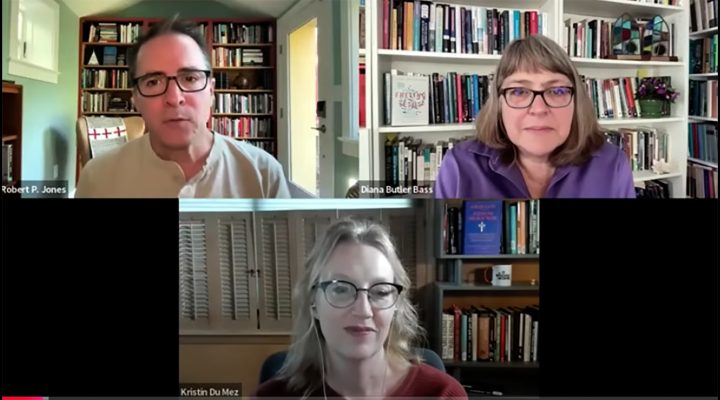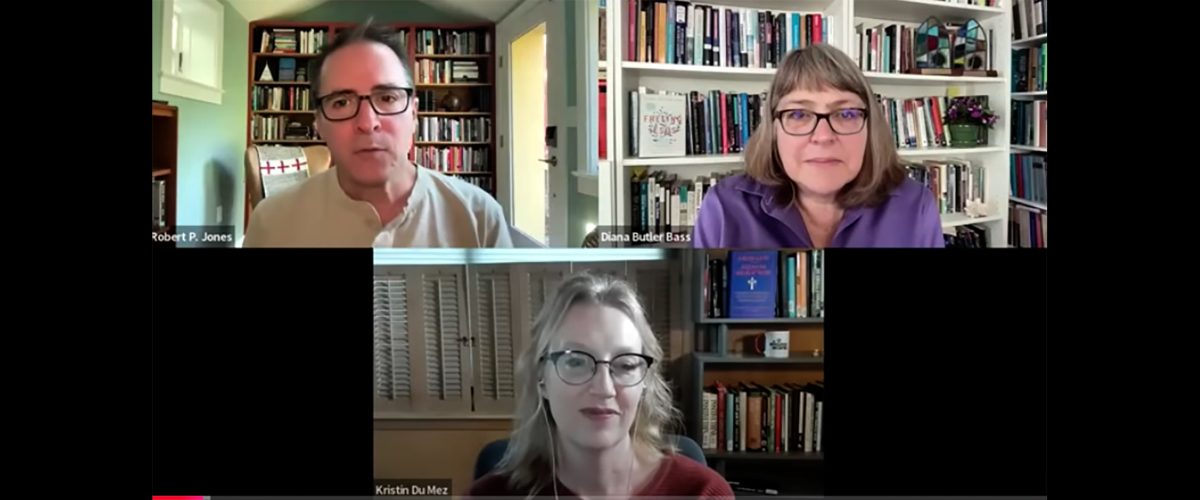Americans must resist the impulse to stay quiet in the face of Donald Trump’s election promises to seek revenge against political opponents, dismantle civil rights and limit religious freedoms to Christian nationalists, Kristin Du Mez said.
It’s tempting to preemptively hunker down knowing one possible outcome of the 2024 election includes the establishment of an authoritarian, theocratic form of government with retribution vowed against those who oppose it, she said during “The Convocation Unscripted” webinar.
“If you muzzle yourself in advance because of what you think might happen, that creates the conditions for bad things to happen. But the more of us who are out there using our freedom to its fullest extent while we have it, the less danger there is to any one of us,” said Du Mez, professor of gender, religion and politics at Calvin University in Michigan and author of the bestselling book Jesus and John Wayne: How White Evangelicals Corrupted a Faith and Fractured a Nation.
She joined fellow religion and politics experts Diana Butler Bass and Robert P. Jones on the Nov. 1 episode of the webinar connected to “The Convocation” Substack they share with Jemar Tisby, a history professor at Simmons College of Kentucky and author of numerous books including the bestseller The Color of Compromise: The Truth About the American Church’s Complicity in Racism.
Their discussion, “Uncertainty, Courage and Refusing to Obey in Advance,” was their last before the election. Tisby was not present for the session that opened with a survey of participant’s emotions as Nov. 5 approached.
“I have endless migraines and I can’t sleep.”
“I have endless migraines and I can’t sleep, and I think that’s a pretty good indication of where I am,” said Bass, a speaker, writer and former seminary professor whose many books include the bestseller Freeing Jesus: Rediscovering Jesus as Friend, Teacher, Savior, Lord, Way and Presence.
In a sermon at Duke University Chapel Nov. 3, Bass used the New Testament account of the blind beggar sitting by the road as a parallel to the uncertainty of the present moment. The anxiety comes from hearing multiple activities along the road but being unable to see what’s coming, she said.
“I put myself right in that text because that’s what I feel like. I feel like I can’t see what’s coming down the road. And when I said that in the course of the sermon, you could hear a gasp across Duke Chapel, and I actually heard a couple people start to cry. So, I think that feeling of uncertainty is consuming so many of us right now,” she explained.
Bass said she is especially disturbed by reports that Donald Trump is running neck and neck against Democrat Kamala Harris. “That’s what is keeping me up at night. He’s coming out and he’s saying things that are actually quotes from Adolf Hitler and he’s promising to crash the economy and take away the rights of people. And this is close?”
Jones, president of Public Religion Research Institute and author of The Hidden Roots of White Supremacy: And the Path to a Shared American Future, said the exhaustion he feels from speaking and writing about the election was alleviated by the Faith and Democracy Tour he, Butler, Du Mez and Tisby hosted in October in Greensboro, N.C., and Tempe, Ariz.
“It was actually refreshing to be in a room with all of you and also with hundreds of people who are turning out to stand up for faith and democracy and for a vision of Christianity that is not for dominion, but for equality, and for liberty for everyone, not just for white Christians,” he said.
“He’s saying things that are actually quotes from Adolf Hitler and he’s promising to crash the economy and take away the rights of people. And this is close?”
One of the nation’s leading pollsters on religion and culture, Jones added that his emotional outlook also has been helped by not closely monitoring the many election-related surveys being published daily.
“I’ll confess, historically I have been the guy who will hit refresh on the browser looking to see which polls dropped in the last hour,” he said. “And I must tell you, I haven’t done that this year. In fact, the last time I looked at the polling averages was about a week ago. And I just want to offer that as one self-care thing for everyone.”
Yet Jones said election-related issues are primarily what he talks about during family dinners or when socializing with friends. “What’s top of mind that just kind of oozes out of me when I’m given the opportunity? It is Christian nationalism and the way it has taken over one of our two political parties, it is authoritarianism and the racism and the xenophobia, the ‘poisoning the blood of our country,’ ‘vermin’ ‘enemies within,’ and all of that.”
Du Mez said the months and years of writing, giving interviews, public engagements and event coordination in opposition to white Christian nationalism have brought on a deep weariness. “I am exhausted. I mean beyond exhausted. I say that all the time, ‘I’m really tired.’ But this is different. It’s an existential exhaustion. And I kind of hit the wall about a week ago.”
But Du Mez said she has found strength from Timothy Snyder’s On Tyranny: Twenty Lessons from the Twentieth Century, which offers rules for fighting authoritarianism. “My favorite lesson from the 20th century on how to fight authoritarianism is rule No. 1: ‘Do not obey in advance.’ That has been my mantra honestly.”
It means not to be intimidated into surrendering rights or cowering when the supporters of authoritarianism make ominous threats. Otherwise, those forces win even if they haven’t really won, she explained.
“They don’t have to take your rights because they have instilled enough fear that they don’t need to,” Du Mez explained. “They have succeeded in controlling you. What we all need to be doing with whatever is coming down the road next week, next month, next year.”
And there are models to draw from in history, such as the Black church during the Civil Rights era and the sheer resilience and courage required of ordinary African Americans to live in the U.S. through the 1970s, the trio advised.
“We have that history, we have that legacy. And I think we would all do well — particularly for those of us who are white and have not faced that danger in our lives — to remember there are a lot of people who have lived their entire lives with that danger and there are people who have risen above that,” Du Mez said.
Following those examples does not mean conquering fear, she added. “The three of us are scared about what’s to come. But you don’t have to act out of that fear. You can act in spite of that fear and claim that space. So ‘do not obey in advance’ is what I will be holding onto.”
Jones announced “The Convocation Unscripted” will present its first live online session at 5 p.m. Eastern Nov. 7 to discuss moving forward from the 2024 election. The event is free but registration is required.


